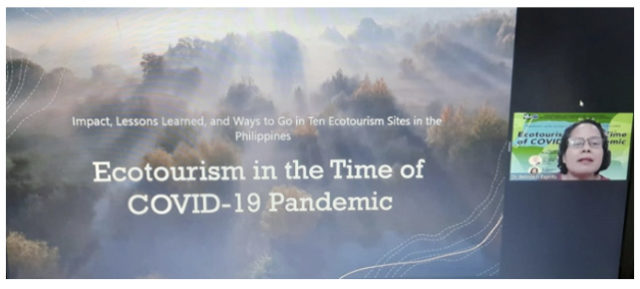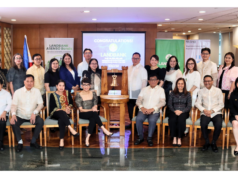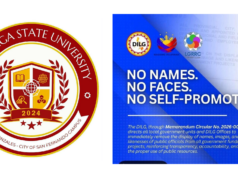Locally, a survey of 247 decision makers, conducted last May 2020, by the Price Waterhouse Cooper, and the Department of Tourism, shows that across the different subsectors investigated on the impact of COVID-19 in the country’s tourism industry, 97% say that COVID-19 can potentially impact on their business operations, and this poses major concern.
Given the travel restrictions and closure of businesses, 88% of the respondents expect losses of over 50% of their 2020 revenues. To cope with the low demand and restrictions, majority of the respondents say that they temporarily stopped offering a service/product, reduced their level of operations, and reduced the employee headcount.
In a webinar on “Ecotourism in the Time of Covid-19 Pandemic: A Rapid Assessment of the Impact of the Pandemic on Ten Ecotourism Sites in the Philippines,” presented by Dr. Belinda F. Espiritu, a professor from the University of the Philippines-Cebu, during the sixth KTOP-COVID (Kapakanan ng Tao sa Oras ng Pandemya – COVID) and organized by the Department of Science and Technology – National Research Council of the Philippines (DOST-NRCP), one ecotourism site reported that during the pandemic, 70% of their service staff were terminated after two months, job order’s work was reduced to 10 days, and staff was no longer allowed to work (no work, no pay).
Espiritu researched on the 10 ecotourism sites located in Laguna, Bataan, Isabela, Sorsogon, Rizal, Davao, Bohol, Iloilo, Surigao del Sur, and South Cotabato, and looked into the impact of COVID-19 on the management and operation of the ecotourism in the different parts of the Philippines.
The study found that except for the very few, most tourism sites had no contingency plans for epidemic outbreaks. On a positive note, though, the quarantine succeeded in bringing out people’s resiliency as exemplified by urban and rural agriculture, cultivation of ornamentals plants for sale, entrepreneurship development, creativity in creating products that sell, and development of livelihood skills.
Another good thing is that the management spent the quarantine period improving the facilities and making COVID-19 responses.
The research suggested that the regional offices of the Department of Tourism should work hand in hand with the local governments units to guide and require tourism industries nationwide to formulate contingency plans in cases of epidemic outbreak, which should include plans for alternative livelihood projects and backup funds for crisis situation like the COVID-19.
According to Espiritu, the lockdowns brought tourism operations to a grinding halt during the community quarantine period, until some sites reopened to residents or local tourists. The cessation led to the laying off of some staff, reduced working hours or days, and work-from-home arrangement, with the skeletal workforce reporting on specific working days.
Based on the report from the Journal of Sustainable Tourism, the unprecedented global travel restrictions and stay-at-home orders are causing severe disruptions of the global economy since World War 2. Tourism largely ceased in March, with the international travel bans affecting over 90% of the world’s population and wide-spread restriction on public gatherings and community mobility.
The webinar is a part of the 2020 National Science and Technology Week (NSTW) of the Department of Science and Technology (DOST). For more information and updates regarding the 2020 NSTW and NRCP’s webinars, please visit the www.nstw.dost.gov.ph and its Facebook page or at NRCP’s Research Pod page on Facebook. (S&T media service, Geraldine Bulaon-Ducusin)





